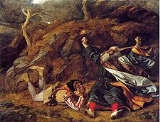
by William Shakespeare
. The title character descends into madness after foolishly disposing of his estate between two of his three daughters based on their flattery
, bringing tragic consequences for all. The play is based on the legend of Leir of Britain
, a mythological pre-Roman
Celtic king. It has been widely adapted for the stage and motion pictures, and the role of Lear has been coveted and played by many of the world's most accomplished actors.
The play was written between 1603 and 1606 and later revised.
Nothing will come of nothing: speak again.![]()
Unhappy that I am, I cannot heaveMy heart into my mouth: I love your majestyAccording to my bond; nor more nor less.![]()
Mend your speech a little,Lest you may mar your fortunes.![]()
Come not between the dragon and his wrath.![]()
Kill thy physician, and the fee bestowUpon the foul disease.![]()
Time shall unfold what plighted cunning hides:Who cover faults, at last shame them derides.![]()
Tis the infirmity of his age: yet he hath ever but slenderly known himself.![]()
Who, in the lusty stealth of nature, takeMore composition and fierce qualityThan doth, within a dull, stale, tired bed,Go to the creating a whole tribe of fopsGot 'tween asleep and wake?![]()
Now, gods, stand up for bastards!![]()

